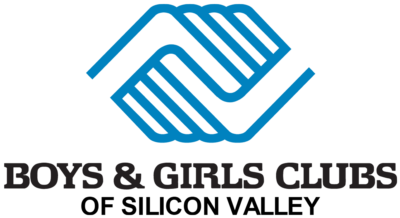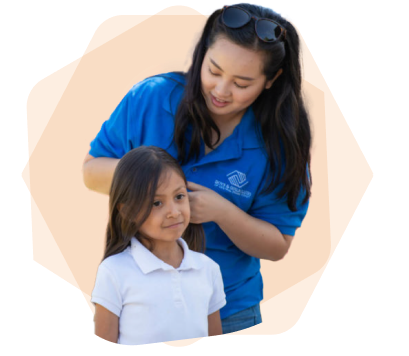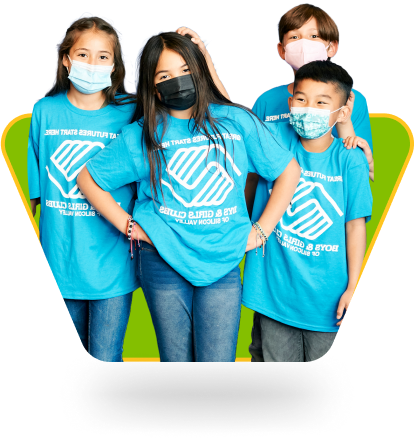How Afterschool Programs Reinforce Social-Emotional Learning
Today’s kids are facing a mental health crisis. In 2021, 4 in 10 students (42%) felt sad or hopeless, and almost one-third (29%) experienced poor mental health.1 The effects of the pandemic, the constant pressure of social media and the world’s complex issues are affecting their well-being.
To help youth grow into healthy, happy adults, Boys & Girls Clubs provide afterschool programs that reinforce and promote social-emotional learning (SEL) — an educational method that teaches young people how to understand their emotions, develop positive relationships, make wise choices and succeed in challenging situations.
“Our approach to social-emotional development is to embed it throughout our programming, so that whether youth in Clubs are coding an app, painting a portrait, playing soccer or designing a service project, they’re building social-emotional skills along the way.” – Chrissy Chen, National Director of Youth Development Programs at Boys & Girls Clubs of AmericaHere are some key ways afterschool programs reinforce social-emotional learning:
Here are some key ways afterschool programs reinforce social-emotional learning:
Holistic Support for Social-Emotional Skills
Afterschool programs that focus on social-emotional learning take a whole-person approach, understanding that a child’s learning and success during school-age years is about more than just grades. They teach social-emotional skills that help kids form good relationships, build trust, feel safe and connected and have positive interactions with others.2
Role Modeling and Mentoring
According to Boys & Girls Clubs of America’s 2023 Youth Right Now data, 92% of young people today want to help when someone has a problem and 85% say they try to think about how their actions affect others when making a decision.
In afterschool programs, this empathy is nurtured by supportive adults like Club staff and caring mentors who act as role models, teaching kids how to get along with others and understand their emotions. They set a good example by listening carefully to kids, staying strong during tough times and solving problems in a positive way.
For example, when kids see staff members considering someone else’s feelings during an argument, or when they are encouraged to relate their own experiences to characters in books they read, they learn how to see things from other people’s diverse perspectives. Seeing such positive behaviors in real-life situations inspires kids to become more emotionally aware, empathetic and better communicators themselves.
Family and Caregiver Engagement
Families play an important role in shaping young people’s social-emotional learning. When families collaborate with a child’s educators, mentors or Club staff to create a supportive ecosystem, it:
- Builds strong relationships based on trust and respect. Talking openly and kindly helps everyone understand and support each other.
- Promotes open, two-way communication. Keeping parents updated on how the child is doing and getting their input helps everyone focus on the same goals.
- Creates a team of supporters. Parents and staff working together on activities make the child feel included and part of the team.
- Respects and celebrates everyone’s differences. Including different ideas and traditions makes all kids feel special and appreciated.
- Ensures that everyone is intentionally supporting the child. By setting clear goals together, they create a safe and caring place for the child to learn and grow.
By actively involving families, afterschool programs more effectively help kids with their feelings and social skills, which helps them grow into well-adjusted and confident adults.
Provide a Trauma-Informed Approach
By the time they turn 16, around two-thirds of young people have gone through at least one traumatic event, which can make them more likely to face health issues, academic problems and other challenges later in life.3 Adopting a trauma-informed approach can help ensure kids get the support they need to stay healthy, focused in school and resilient.
Boys & Girls Clubs are dedicated to becoming the largest trauma-informed youth-serving organization. Understanding the significance of trauma, Clubs provide a nurturing environment where kids and teens can build trust, feel understood and develop essential coping skills.
“This post-Covid season is full of opportunities for supporting social-emotional development and skill building related to how youth develop a healthy relationship with themself and others, recognize and manage their emotions and make responsible decisions.”- Chrissy Chen, National Director of Youth Development Programs at Boys & Girls Clubs of America
With a trauma-informed approach, which includes environmental adjustments, professional practices and social emotional learning activities, Clubs help not only those who have experienced trauma, but also all young people as they grow and develop emotionally.
Building Resilience Starts Here
Social Emotional Learning is at the heart of Boys & Girls Club’s mission to enable all young people to reach their full potential as productive, caring, responsible citizens. Your support helps ensure kids stay on track both academically and emotionally, creating tomorrow’s resilient and emotionally intelligent leaders.

Sources
1 Protecting Youth Mental Health: The U.S. Surgeon General’s Advisory – https://www.hhs.gov/sites/default/files/surgeon-general-youth-mental-health-advisory.pdf
2 Why Afterschool Programs Need Social and Emotional Learning Now – https://www.wallacefoundation.org/news-and-media/blog/pages/why-afterschool-programs-need-social-and-emotional-learning-sel-now.aspx
3 Understanding Childhood Trauma – https://www.samhsa.gov/child-trauma/understanding-child-trauma







